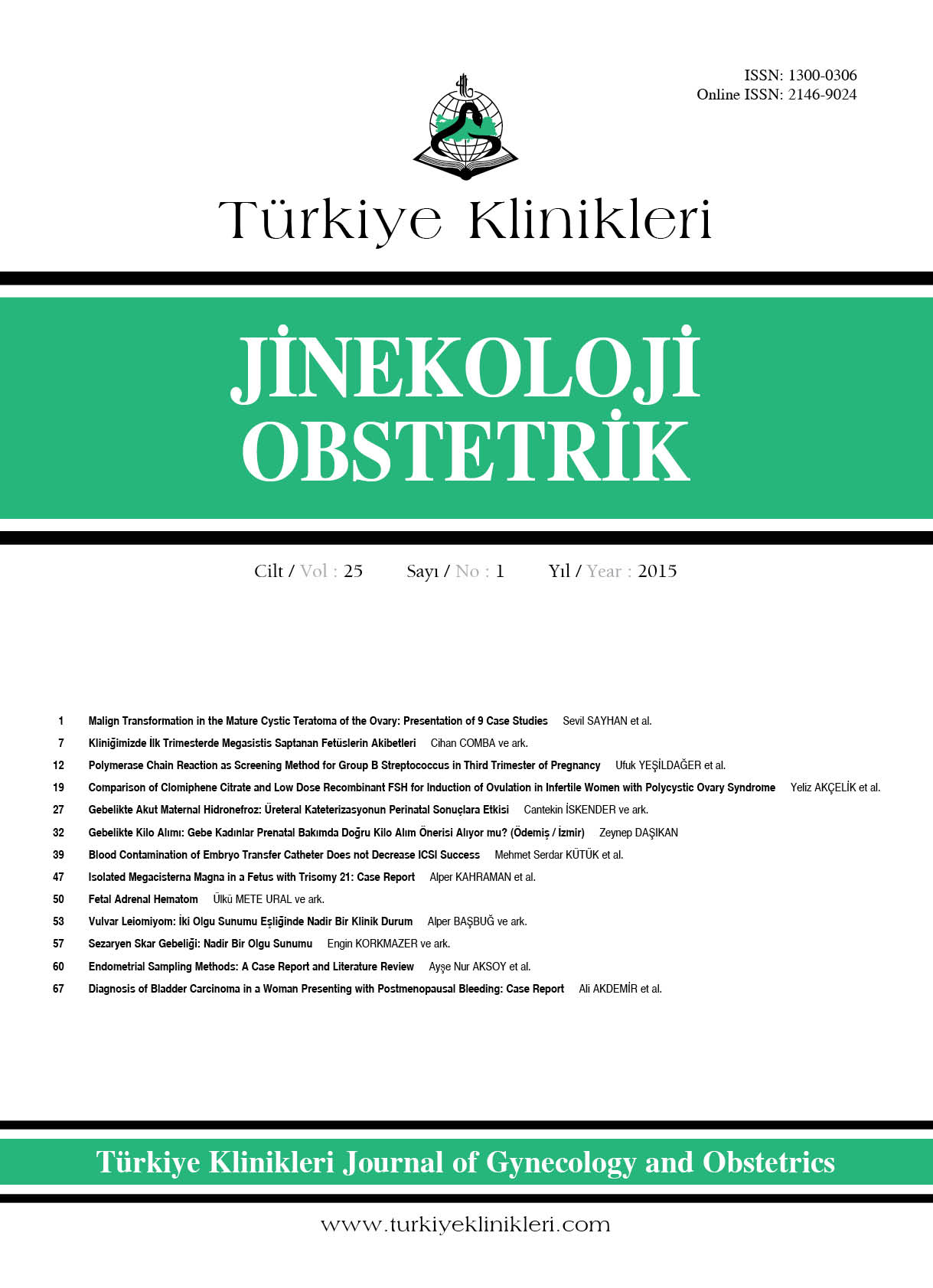Open Access
Peer Reviewed
ORIGINAL RESEARCH
2565 Viewed1252 Downloaded
Polymerase Chain Reaction as Screening Method for Group B Streptococcus in Third Trimester of Pregnancy
Gebeliğin Son Trimesterinde Grup B Streptokok Tarama Yöntemi Olarak Polimeraz Zincir Reaksiyonu
Turkiye Klinikleri J Gynecol Obst. 2015;25(1):12-8
DOI: 10.5336/gynobstet.2014-41167
Article Language: EN
Article Language: EN
Copyright Ⓒ 2025 by Türkiye Klinikleri. This is an open access article under the CC BY-NC-ND license (http://creativecommons.org/licenses/by-nc-nd/4.0/)
ABSTRACT
Objective: The present study aims to evaluate the efficiency of a rapid real-time polymerase chain reaction (PCR) assay in order to determine maternal group B streptococcus (GBS) colonization in the third trimester of pregnancy. Material and Methods: This prospective study reviewed 70 healthy women with term pregnancies who were consecutively admitted to the study center for routine prenatal care from June 2012 to December 2012. Results: The prenatal GBS colonization rate was 15.7% by the PCR technique. Perinatal complications including abortus imminens, fetal growth restriction, premature rupture of membranes, preterm delivery, meconium stained amniotic fluid and chorioamnionitis were significantly more frequent in women with GBS positivity (respectively p=0.011, p=0.023, p=0.001, p=0.001, p=0.023 and p=0.001). Puerperal fever was significantly more frequent in women who were GBS positive (p=0.001). The need for neonatal intensive care unit and neonatal pneumonia were significantly more frequent for the neonates that were born to women with GBS positivity (p=0.001 for both). Conclusion: The real-time PCR assay can be defined as an accurate test to identify the GBS carriers at the third trimester of pregnancy. This easily applicable tool could enhance the exact identification of candidates for chemoprophylaxis, including women carrying a risk for premature rupture of membranes or preterm labor.
Objective: The present study aims to evaluate the efficiency of a rapid real-time polymerase chain reaction (PCR) assay in order to determine maternal group B streptococcus (GBS) colonization in the third trimester of pregnancy. Material and Methods: This prospective study reviewed 70 healthy women with term pregnancies who were consecutively admitted to the study center for routine prenatal care from June 2012 to December 2012. Results: The prenatal GBS colonization rate was 15.7% by the PCR technique. Perinatal complications including abortus imminens, fetal growth restriction, premature rupture of membranes, preterm delivery, meconium stained amniotic fluid and chorioamnionitis were significantly more frequent in women with GBS positivity (respectively p=0.011, p=0.023, p=0.001, p=0.001, p=0.023 and p=0.001). Puerperal fever was significantly more frequent in women who were GBS positive (p=0.001). The need for neonatal intensive care unit and neonatal pneumonia were significantly more frequent for the neonates that were born to women with GBS positivity (p=0.001 for both). Conclusion: The real-time PCR assay can be defined as an accurate test to identify the GBS carriers at the third trimester of pregnancy. This easily applicable tool could enhance the exact identification of candidates for chemoprophylaxis, including women carrying a risk for premature rupture of membranes or preterm labor.
ÖZET
Amaç: Bu çalışma, gebeliğin son trimesterinde maternal grup B streptokok (GBS) kolonizasyonunu belirlemek amacıyla hızla sonuç veren gerçek zamanlı polimeraz zincir reaksiyonu (PCR) yöntemi etkinliğinin değerlendirilmesini amaçlamaktadır. Gereç ve Yöntemler: Haziran 2012 ile Aralık 2012 arasında rutin gebelik takibi için çalışma merkezine başvuran ve gebeliğinin son trimesterinde bulunan ardışık 70 sağlıklı gebe kadın ileriye dönük olarak incelenmiştir. Bulgular: Doğum öncesi dönemde grup B streptokok kolonizasyonu sıklığı %15,7 olarak hesaplandı. Grup B streptokok kolonizasyonu olmayan kadınlara göre, grup B streptokok kolonizasyonu olan kadınlarda abortus imminens, fetal büyüme kısıtlılığı, prematür membran rüptürü, preterm doğum, mekonyumlu amnion sıvısı, koryoamnionit ve puerperal ateş gibi perinatal komplikasyonlar anlamlı olarak daha sık bulundu (sırasıyla p=0,011, p=0,023, p=0,001, p=0,001, p=0,023, p=0,001 ve p=0,001). Grup B streptokok ile kolonize kadınların bebeklerinde yoğun bakım gereksinimi ve yenidoğan pnömonisi sıklığı, kolonize olmayanlara göre anlamlı olarak daha yüksekti (her ikisi için p=0,001). Sonuç: Gerçek zamanlı PCR, gebeliğin son trimesterinde grup B streptokok taşıyıcısı olan kadınları kesin olarak belirleyebilecek bir yöntemdir. Kolaylıkla uygulanabilen PCR, prematür membran rüptürü veya preterm eylem bakımından risk taşıyan ve grup B streptokok için ilaç profilaksisi gerçekleştirilebilecek olguların atlanmadan tanımlanmasını sağlayabilir.
Amaç: Bu çalışma, gebeliğin son trimesterinde maternal grup B streptokok (GBS) kolonizasyonunu belirlemek amacıyla hızla sonuç veren gerçek zamanlı polimeraz zincir reaksiyonu (PCR) yöntemi etkinliğinin değerlendirilmesini amaçlamaktadır. Gereç ve Yöntemler: Haziran 2012 ile Aralık 2012 arasında rutin gebelik takibi için çalışma merkezine başvuran ve gebeliğinin son trimesterinde bulunan ardışık 70 sağlıklı gebe kadın ileriye dönük olarak incelenmiştir. Bulgular: Doğum öncesi dönemde grup B streptokok kolonizasyonu sıklığı %15,7 olarak hesaplandı. Grup B streptokok kolonizasyonu olmayan kadınlara göre, grup B streptokok kolonizasyonu olan kadınlarda abortus imminens, fetal büyüme kısıtlılığı, prematür membran rüptürü, preterm doğum, mekonyumlu amnion sıvısı, koryoamnionit ve puerperal ateş gibi perinatal komplikasyonlar anlamlı olarak daha sık bulundu (sırasıyla p=0,011, p=0,023, p=0,001, p=0,001, p=0,023, p=0,001 ve p=0,001). Grup B streptokok ile kolonize kadınların bebeklerinde yoğun bakım gereksinimi ve yenidoğan pnömonisi sıklığı, kolonize olmayanlara göre anlamlı olarak daha yüksekti (her ikisi için p=0,001). Sonuç: Gerçek zamanlı PCR, gebeliğin son trimesterinde grup B streptokok taşıyıcısı olan kadınları kesin olarak belirleyebilecek bir yöntemdir. Kolaylıkla uygulanabilen PCR, prematür membran rüptürü veya preterm eylem bakımından risk taşıyan ve grup B streptokok için ilaç profilaksisi gerçekleştirilebilecek olguların atlanmadan tanımlanmasını sağlayabilir.
MENU
POPULAR ARTICLES
MOST DOWNLOADED ARTICLES





This journal is licensed under a Creative Commons Attribution-NonCommercial-NoDerivatives 4.0 International License.










